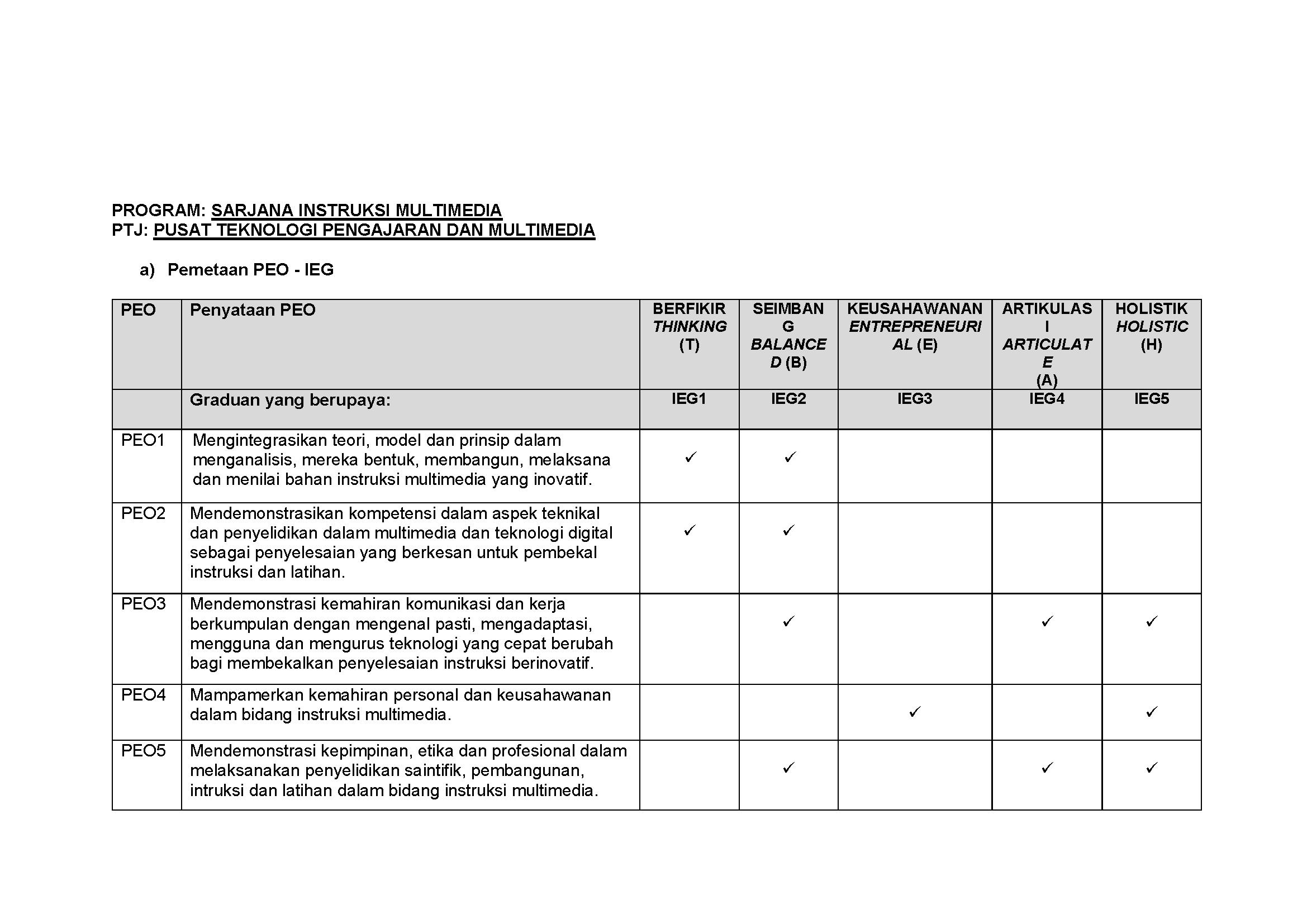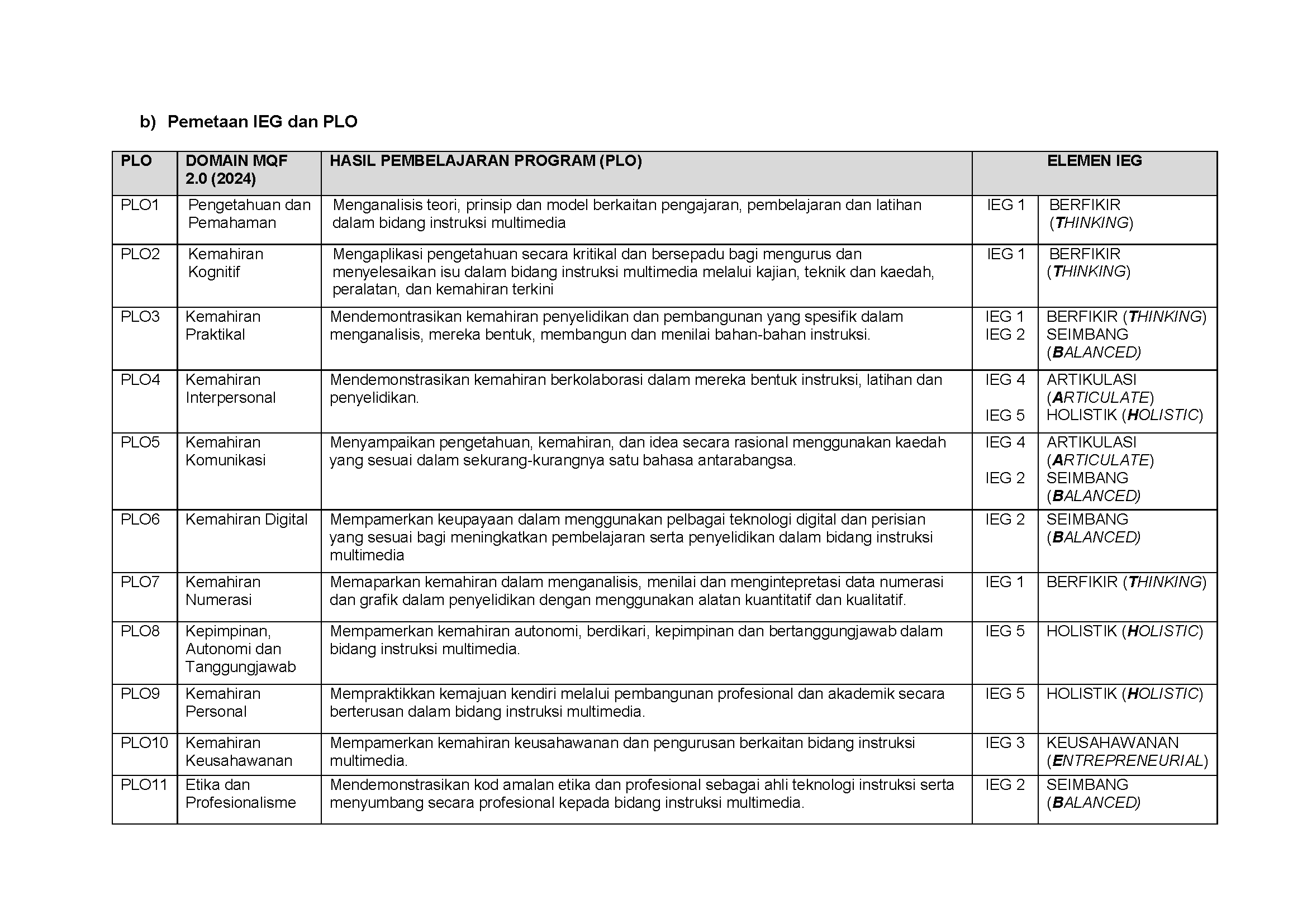Graduate Programs
- Academic Programs
- Master of Instructional Multimedia
- Research Mode
- Master in Learning Design and Technology (MLDT)
- E-book
- Add and Drop Course(s)
- Pemetaan PEO & PLO-IEG MQF2024
Academic Programs
PTPM offers three postgraduate degrees in the field of instructional / educational technology:
- Master of Instructional Multimedia (MIM)
- Master of Art (MA)
- Doctor of Philosophy (PhD)
- Master in Learning Design and Technology (MLDT)
Master of Instructional Multimedia
The Masters of Instructional Multimedia (MIM) program is offered to semi professionals, professionals as well as graduates from various educational and training backgrounds. It provides an opportunity to educators and professionals in the application and production of multimedia in education and training. It also allows an avenue for industries and training centers to train and improve their human resource. Graduates from this program would be able to contribute in marketing their products and services, as well as enhance their corporate images through the application of multimedia primarily in training, corporate communication, promotional planning, resource management etc.
PROGRAM EDUCATIONAL OBJECTIVES, (PEO)
| PEO1 | : | Integrate theories, models and principles in analyzing, designing, developing, implementing and evaluating innovative instructional multimedia materials. | |
| PEO2 | : | Demonstrate technical and research competencies in multimedia and digital technologies as effective solutions for instruction & training providers | |
| PEO3 | : | Demonstrate communication and teamwork skills by identifying, adapting, utilizing and managing rapidly changing technology to provide innovative instructional solutions. | |
| PEO4 | : | Exhibit personal and entrepreneurial skills in the field of instructional multimedia. | |
| PEO5 | : | Demonstrate leadership, ethical and professionalism in conducting scientific research, development, instruction and training in the field of Instructional multimedia. |
PROGRAM LEARNING OUTCOMES, (PLO)
- Knowledge and Understanding – Critically discuss, synthesize, and analyze instructional theories, models, principles, and applications in instructional multimedia.
- Practical Skills – Demonstrate specific research and development skills in analyzing, designing, developing, and evaluating instructional materials.
- Cognitive Skill – Apply knowledge critically and integratively to manage and resolve complex problems/issues in the field of instructional multimedia through research, using advance techniques, tools, skills or various approaches for decision making and producing new ideas, and/or innovative solutions or practice.
- Communication Skill - Communicate clearly the knowledge, skills, ideas, critique and conclude/rationalize using appropriate methods to peers, experts, and non-experts in at least one international language (English).
- Interpersonal skills – Demonstrate the ability to work collaboratively in designing instruction, training and conducting research in the field of instructional multimedia.
- Ethics and Professionalism – Conduct research on multimedia instructional technology applications by identifying, summarizing and generate creative, innovative, and effective resolution through ethical and reflective judgement. Demonstrate ethical and professional codes of practice as an instructional technologist, and professionally contribute to the field.
- Personal Skills - exemplify self-improvement through continuous professional and academic development in the field of instructional multimedia
- Entrepreneurial Skills – initiate and demonstrate entrepreneurial and management skills related to the field of instructional multimedia.
- Leadership, autonomy & responsibility – demonstrate significant autonomy, independence, leadership, responsibility, and interpersonal skills in the field of instructional multimedia.
- Digital Skill – Competently use a wide range of suitable digital technologies and tools as well as appropriate software to enhance study and research in the field of instructional multimedia
- Numeracy Skill – Show skills in analyzing, evaluating and interpreting numerical and graphical data in research using mathematical and other quantitative and qualitative tools
PROGRAM STRUCTURE OF MIM
Core Courses: 24 units
| QIM 501E/4 * | Instructional Design & Delivery |
| QIM 503/4 | Visual Communication |
| QIM 504E/4 * | Multimedia Authoring |
| QIM 505/4 | Multimedia Project Management |
| QIM 511/4 | Research Methods and Issues in Instructional Multimedia |
| QIM 512E/4 * | Multimedia Based Instructional Design |
Elective Courses: 12 units
| QIM 502/4 | Human Computer Interaction |
| QIM 506/4 | 3D Visualization and Animation |
| QIM 507/4 | Web-Based Training and Management |
| QIM 508/4 | Digital Audio & Video Production |
| QIM 509E/4 * | Web-based Programming |
| QIM 510/2 | Topical Seminar |
Practicum Course: 6 units
| QIM 520/6 | Research Internship |
Note: The * indicates that these courses will be conducted in English.
Research Mode
The Master of Arts in Educational Technology is a research programme that is offered throughout the year. The programme is offered in full-time and part-time modes, to qualified Malaysian and International Students to do independent research supervised by their respective lecturers in the field of educational technology. As the field of educational technology is dynamic, new areas/fields of study are always emerging as newer technological tools and developments become available. Upon graduation, students may be employed as teachers, lecturers, trainers, instructional designers, etc. in both the public and private sectors.
Research Thrust Areas:
Instructional Design and Technology
- Instructional Strategies
- Visual Communication
- Instructional Systems Development
- Instructional Design Model
- Evaluation of Instructional Technology
- Multimedia Design
Information and Communication Technology (ICT) in Education/Training
- E-learning
- Human Computer Interaction
- Instructional Multimedia
- Mobile Learning
- Social Media Based Learning
Management and Utilization of Instructional Technology
- Management of Educational / Training Resources
- Instructional Innovation
- Technology Leadership
Performance Technology
- Assistive / Adaptive Technology
- Gamed-based Learning
- Persuasive Technology
- Virtual Reality / 3D / Augmented Reality
PHD (EDUCATIONAL TECHNOLOGY)
OVERVIEW
Doctor of Philosophy in Educational Technology are research programmes offered throughout the year. These programmes are offered as full-time and part-time modes to qualified Malaysian and International Students to do independent research supervised by their respective lecturers in the field of educational technology. As the field of educational technology is dynamic, new areas/fields of studies are always emerging as newer technological tools and developments become available. Upon graduation, students may be employed as teachers, lecturers, trainers, instructional designers etc. in both public and private sectors.
Research Thrust Areas:
Instructional Design and Technology
- Instructional Strategies
- Visual Communication
- Instructional Systems Development
- Instructional Design Model
- Evaluation of Instructional Technology
- Multimedia Design
Information and Communication Technology (ICT) in Education/Training
- E-learning
- Human Computer Interaction
- Instructional Multimedia
- Mobile Learning
- Social Media Based Learning
Management and Utilization of Instructional Technology
- Management of Educational / Traininf Resources
- Instructional Innovation
- Technology Leadership
Performance Technology
- Assistive / Adaptive Technology
- Gamed-based Learning
- Persuasive Technology
- Virtual Reality / 3D / Augmented Reality
Master in Learning Design and Technology (MLDT)

Overview
Learn. Design. Lead. – Inspiring educators and professionals to create innovative, technology-driven learning experiences.
The Master in Learning Design and Technology (MLDT) is a 40-unit mixed mode programme that combines coursework and research to develop expertise in learning design and technology. It equips learners with the skills to integrate technology, design innovative learning experiences, and apply research-driven solutions in education and training.
Why Choose MLDT?
- Future-Ready Curriculum – Stay ahead with courses in AI, immersive learning, and learning analytics.
- Flexible Learning – Available in full-time and part-time modes.
- Industry-Relevant – Designed for educators, instructional designers, and corporate trainers.
- Practical & Research-Driven – Gain hands-on experience in learning technology applications.
Who Should Enrol in This Programme?
The MLDT programme is ideal for:
- Educators & Academics – Teachers, lecturers, and curriculum developers looking to integrate technology into teaching.
- Instructional Designers & Learning Consultants – Professionals designing and evaluating digital learning experiences.
- Corporate & Workplace Trainers – HR professionals and trainers seeking innovative training solutions.
- E-Learning & Educational Technology Specialists – Individuals involved in e-learning, instructional technology, or educational software.
- Technology & Project Managers in Education – Those leading educational technology projects or platform development.
- Researchers & Academicians – Those exploring research in learning design and instructional technology.
Programme Structure & Duration
Mode of Study: Full-time / Part-time
Duration:
- Full-time: Min 2 semesters / Max 4 semesters
- Part-time: Min 4 semesters / Max 8 semesters
Courses Offered (40 Units)
All students enrolled in the MLDT programme must complete the following courses:
- Instructional and Learning Design
- Learning Technology and Innovation by Design
- Development of Immersive Learning Environment
- Learning Analytics
- Artificial Intelligence in Education
- Research Methodology in Learning Design and Technology
- Dissertation
Career Opportunities
Graduates of the MLDT programme can pursue diverse roles in education, corporate training, and technology-driven learning environments, including:
- Learning & Instructional Design: Learning Designer, Learning Experience Designer, Instructional Designer, Instructional Systems Designer
- Consulting & Strategy: Instructional Consultant, Learning Consultant, Performance Improvement Specialist
- Technology & E-Learning: E-Learning Designer, Technology Project Manager, Technology Product Developer
- Training & Development: Training Specialist, Training Analyst
- Leadership & Analytics: Academic Director, Learning Analytics Specialist
Fee
Malaysia Students: RM 21,000.00
International Students: USD 8,000.00
E-book
Add and Drop Course(s)
REMINDER TO APPLICANT:
1. Starting Week 3 (30.10.2023 )
Course adding, student will be charged RM50 per application (Penalty) without any valid reason.
Course dropping within this period (FEES ARE NOT REFUNDABLE/ CARRY FORWARD)
2. Starting week-4, adding /dropping of subject (s) has to be endorsed by Deputy Vice-Chancellors Academic and International.
3. It is your responsibility to check whether your courses have been updated and the examination slip coincides with the remaining units and courses.
4. Fee Regulations: Courses dropped during week 1 & 2 :- Eligible for fee credit. Fees are not refundable or credited after the 3rd week.
5. Payment of additional fee: IPS will provide the information via email upon approval from School/Centre/Institute.
Pemetaan PEO & PLO-IEG MQF2024

